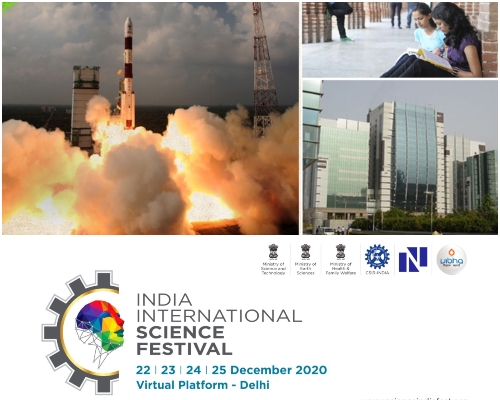IISF-2020 in the Year of Reforms
Total Views |
It will be foolhardy to think that as 2020 comes to an end, India’s views and concerns about its scientific output are as they were in 2019. So, what changed in 2020? Where science was largely considered as an instrument of India’s soft power in 2019, 2020 bared the meaning of hard power science. COVID-19 made Indians collectively comprehend the dire hazards to the nation from the weak science-to-economy linkages, the deep gaps in churning innovation and spin-offs, the burdensome and impractical over-dependence on imports, and moreover the mismanagement of trained human resource in the country.
The COVID-19 global pandemic has impacted almost every sector of the worldwide economy. This impact is profoundly visible in the topics discussed in scientific conferences and webinars, and the India International Science Festival has been no exception. The three science-line ministries – the Ministry of Science and Technology, Ministry of Earth Sciences, and the Ministry of Health and Family Welfare – are the usual carriers of the IISF. However, sensing the COVID-19 created global turbulence, the IISF-2020 is witnessing a whole-of-government participation. Most of the 41 conclaves within the IISF-2020 saw active attendance by ministers and secretaries of other central ministries, state government ministries, and public and private-sector industries associated with them. This expanded representation is of greater importance for the recently initiated multi-sectoral reforms.

Take for instance the agriculture sector reforms. The recently sanctioned Farmers’ Produce Trade and Commerce (Promotion and Facilitation) Act, Farmers (Empowerment and Protection) Agreement on Price Assurance and Farm Services Act, and the Essential Commodities (Amendment) Act are poised to stimulate the use of robotic, digital, sensory, artificial intelligence, data analytics, machine learning, software as a service (SAAS) technologies along the entire farm-to-plate value chain. With a broader market reach in hand, farmers will use these technologies profusely to increase their farm yield, monitor the impact of climate and environment on their produce, and maintain a sturdy value chain to retrieve more excellent value on investments. These agriculture-related technology topics made their way in the IISF-2020.
In 2020, India initiated production-linked incentive schemes for few but important high-technology manufacturing sectors. These include active pharmaceutical ingredients (API), medical instrumentation, next-generation energy storage cells, mobile phones, semiconductors, solar modules, specialty steel, and food products. For a long time, India was heavily dependent on importing these products, which made us vulnerable to supply chain interruptions and deliberate blockages. The near-absence of manufacturers and innovation startups dealing with these products inhibited the holistic growth of deep-technology ecosystems across the country. This topic also has found its way in the IISF2020.
Then the country, in 2020, also decided to promote private sector participation in national space activities and in the defense-sector we have identified hundreds of products for end-to-end innovation-to-manufacturing in India. All these and the reforms mentioned above concur that India’s science pursuits are on the brink of a paradigm shift, and it no more can be contained within the classical three science-line ministries. Furthermore, with the government disbursing finances for scientific research through various grants, fund-of-funds, and via both science-line and other ministries, there is a likelihood that applied scientific research is bound to absorb business-like attributes and best practices with tangible goals in sight. The new science-financing demands training of young scientists and students in technology transfer, intellectual property management, research commercialization, and science financing mechanisms. This training should become a moot point in the next IISF 2021.
The IISF-2020, now virtual due to the pandemic, is a crucial platform to convey the requisites manifest by these reforms to all Indians. The festival has vast student participation, and exposing them to these strategic national needs will condition them to contemporary realities and prepare them for the career that lies ahead of them. India’s science and technology infrastructure are gradually expanding from limited confines of national laboratories, and institutions of national importance to a much wider gamut of private universities, startups, and industries. In the coming years, the IISF will become an indispensable platform to bring all these crucial blocs together to attain national strategic interests.

